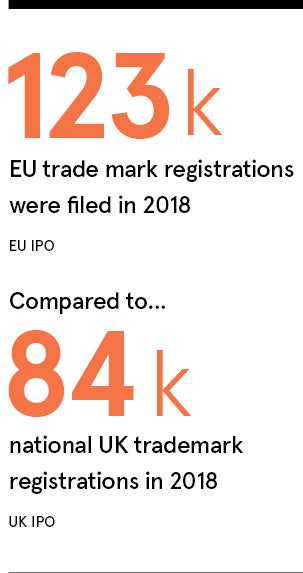The continuing uncertainty over Brexit is causing a growing number of companies to rethink how they manage their brand protection. A no-deal exit on March 29, 2019 now looks less likely, but even if an agreement of some kind is reached, the UK’s departure from the European Union and the EU’s single trademark registration system will have a profound effect on British businesses.
Assuming that Brussels and London do manage to reach an agreement, UK businesses will still have to change the way in which they manage their intellectual property (IP) and brand ownership.
“At the moment you can file a European trademark which is valid across the EU,” says David Potter, head of the trademarks team at HGF, a pan-European IP law firm with offices in the UK, The Netherlands, Germany, Austria, Ireland and Switzerland. “This has been very popular because for one fee, at a relatively low cost, you can get registration covering the whole of the EU and all the member states including the UK.”
 If a deal is reached, then from January 1, 2021 the UK will no longer be part of this arrangement. There is an agreed process that will allow UK rights to be created that mirror EU rights. However, this relatively simple exercise could be an administrative burden for brand owners with numerous EU trademark registrations.
If a deal is reached, then from January 1, 2021 the UK will no longer be part of this arrangement. There is an agreed process that will allow UK rights to be created that mirror EU rights. However, this relatively simple exercise could be an administrative burden for brand owners with numerous EU trademark registrations.
After Brexit, both EU and UK trademark registrations will have to be filed, and brand owners will be well advised to identify, retain and brief law firms that have trademark expertise across the EU and the UK. As well as being more time consuming, it will also add to costs. And yet brand protection is arguably more important today than ever before.
“Trademarks are one of the most valuable assets that any company has these days,” says Mr Potter. “Because of the way businesses are changing, these intangible assets are becoming increasingly important. IP and in particular the goodwill and reputation associated with their brands accounts for a growing proportion of the value of many companies.”
The prospect, in a post-Brexit world, of the additional costs and management burdens required to protect their brands throughout the whole of Europe, including the UK, is obviously unappealing for any business leader or their in-house legal counsel. Already many law firms are trying to work out how to respond to this new challenge and to demands made by their clients looking to protect their brands across the whole of Europe.
Some law firms are aiming to create alliances and working relationships with IP specialist law firms in France, Germany, The Netherlands and other major European states. However, developing these arrangements will also take time and is likely to lead to higher cost, which could be passed on to clients in some way.
However, an alternative is already available. Mr Potter says: “Even before Brexit, because of the increasingly international dimension of IP and brand management, HGF was expanding its presence and expertise across the EU and Switzerland; more important for when the UK is positioned outside the EU.
“This one-stop-shop approach is proving increasingly attractive to a growing number of companies that are keen to get ahead of the game and protect their IP whatever the nature of the relationship that evolves over the next few years between the UK and EU.”
Mr Potter is conscious that Brexit has presented business leaders with a dauntingly large inbox. However, he argues that protection of their brands should be a priority. “Now is the time to find a law firm that can manage and protect brands seamlessly across the UK and EU,” he says.
For more information please visit hgf.com

